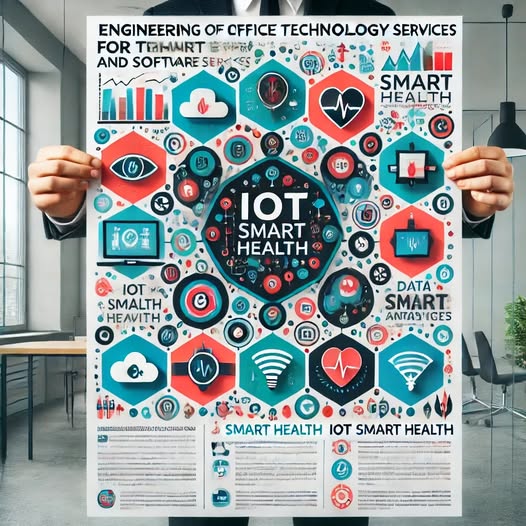
About Course
Course Title: IoT Smart Health
Course Code: [27022-COs-CS]
Category: Internet of Things (IoT), Healthcare Technology
🧩 Introduction
The intersection of IoT (Internet of Things) and healthcare is transforming how we monitor, manage, and deliver health services. This course explores the foundational principles and real-world applications of IoT in smart health systems. Participants will learn how to design, prototype, and evaluate IoT-enabled health monitoring and diagnostics systems using modern sensors, communication protocols, and data analytics platforms.
Module 1: Introduction to IoT and Smart Healthcare
-
Definition of the Internet of Things (IoT)
-
Applications of IoT in healthcare
-
Benefits and challenges of using IoT in healthcare
Module 2: Components of IoT Healthcare Systems
-
Smart devices and medical sensors
-
Gateways and communication protocols (e.g., MQTT, HTTP)
-
Cloud storage and data analytics
Module 3: Wearable Devices
-
Types of wearable devices in healthcare
-
Remote health monitoring
-
Integration with smartphone applications
Module 4: IoT Healthcare Platforms
-
Using platforms like Google Cloud IoT, AWS IoT, Azure IoT
-
Device and data management on cloud platforms
-
Integration with AI technologies for health data analysis
Module 5: Security and Privacy in IoT Health
-
Protecting health data (Data Security)
-
Compliance with healthcare regulations (e.g., HIPAA, GDPR)
-
Identity management and authentication of smart devices
Module 6: Networks and Protocols
-
Communication technologies (WiFi, Bluetooth, Zigbee, LoRa)
-
Secure communication protocols
-
Choosing the right protocol for healthcare applications
Module 7: Practical Applications and Projects
-
Building a health monitoring system using sensors
-
Developing health apps for smartphones
-
Implementing AI-based health data analysis models
🎓 Learning Outcomes
Upon successful completion, learners will be able to:
-
Build and deploy IoT systems for remote health monitoring
-
Collect and analyze real-time physiological data
-
Design secure, cloud-connected medical IoT devices
-
Prototype wearable health systems and mobile alerts
-
Understand the integration challenges with healthcare standards
⏱️ Time Frame
-
Duration: 6 Weeks
-
Sessions: 12 Sessions (2 sessions/week, 2 hours each)
-
Final Project Submission: Week 6
🧭 Course Format
-
Mode: Hybrid (Online + Lab-based Sessions)
-
Structure:
Introduction to IoT and Healthcare Needs, Sensors & Microcontrollers for Health Monitoring, Data Communication & Cloud Platforms, Security & Privacy in IoT Health Systems, Case Studies & Industry Applications, Capstone Project + Evaluation
-
Tools and Software
-
Hardware: Arduino, Raspberry Pi, ESP32 with health sensors
-
Software:
-
IoT Platforms: Google Cloud IoT, AWS IoT, Azure IoT
-
Programming Languages: Python, C/C++
-
Data Analytics: Jupyter Notebook, Pandas, Matplotlib
-
AI/ML Frameworks: TensorFlow, Scikit-learn (optional)
-
Communication: MQTT clients, Wireshark for packet analysis
-
Teaching Methodology
-
Lectures with slides and real-world examples
-
Hands-on labs and demos
-
Group discussions and case studies
-
Project-based learning with milestones
-
Guest lectures from industry experts (optional)
Assessment and Evaluation
-
Quizzes and Assignments: After each major module
-
Lab Exercises: Hands-on sensor integration and cloud data management
-
Midterm Test: Covering theoretical and practical knowledge
-
Final Project:
-
Design and implementation of a functional smart health IoT system
-
Presentation and demonstration
-
Written report including architecture, challenges, and results
-
Additional Resources
-
Research papers and articles on IoT healthcare trends
-
Online tutorials for cloud platforms
-
Open datasets for health monitoring and analysis
-
GitHub repositories with example codes
-
Course Content
IoT Smart Health
Student Ratings & Reviews



